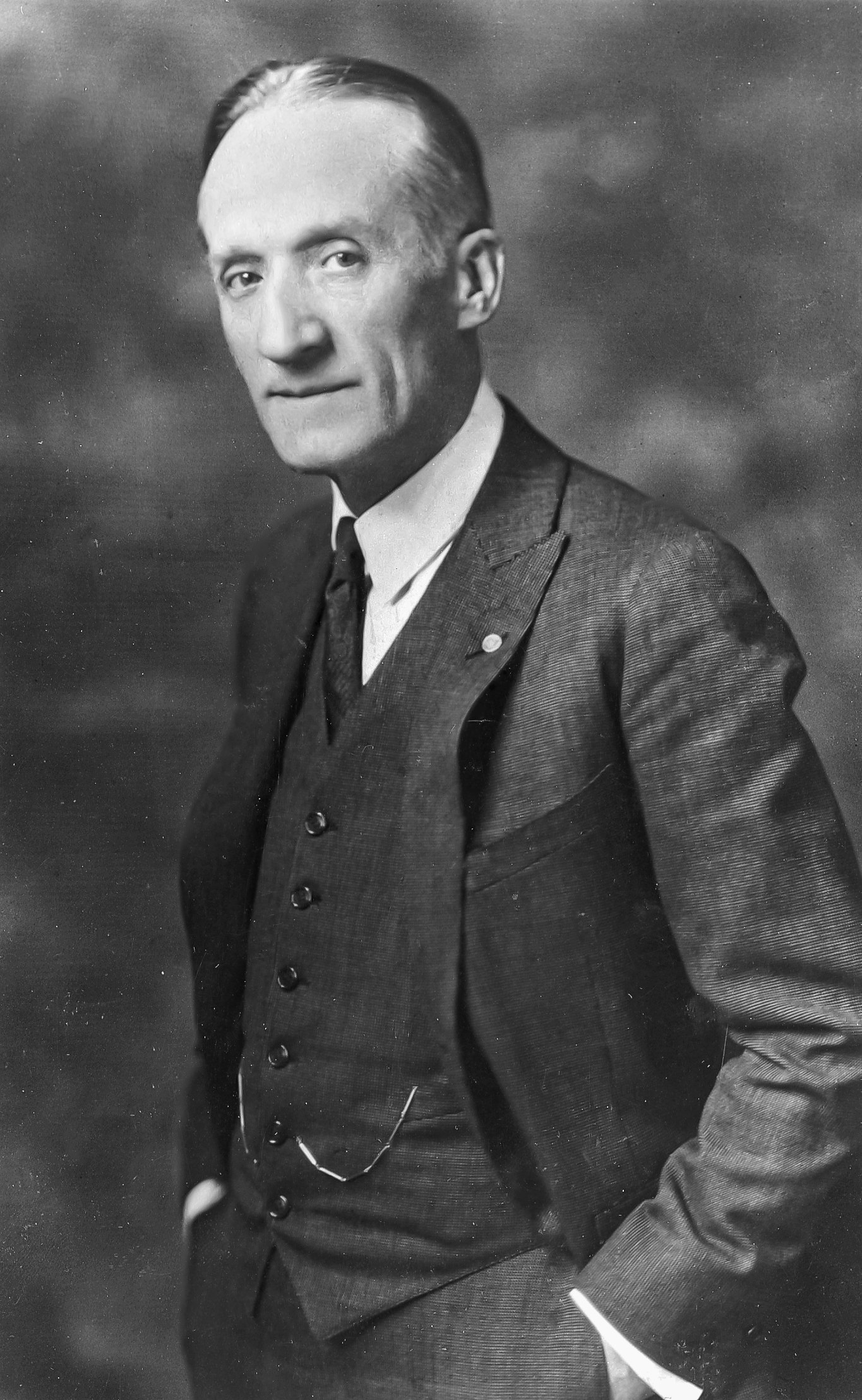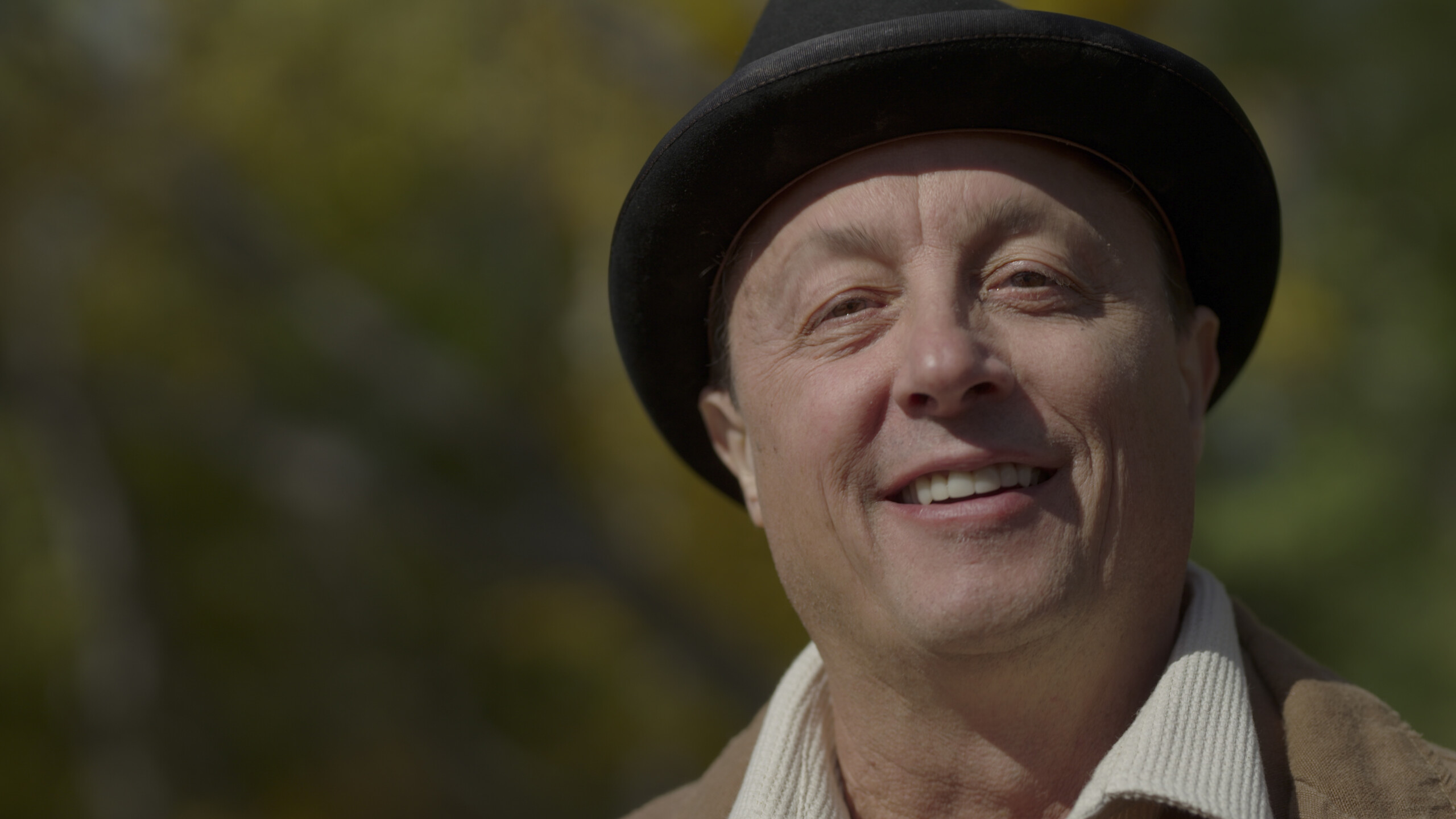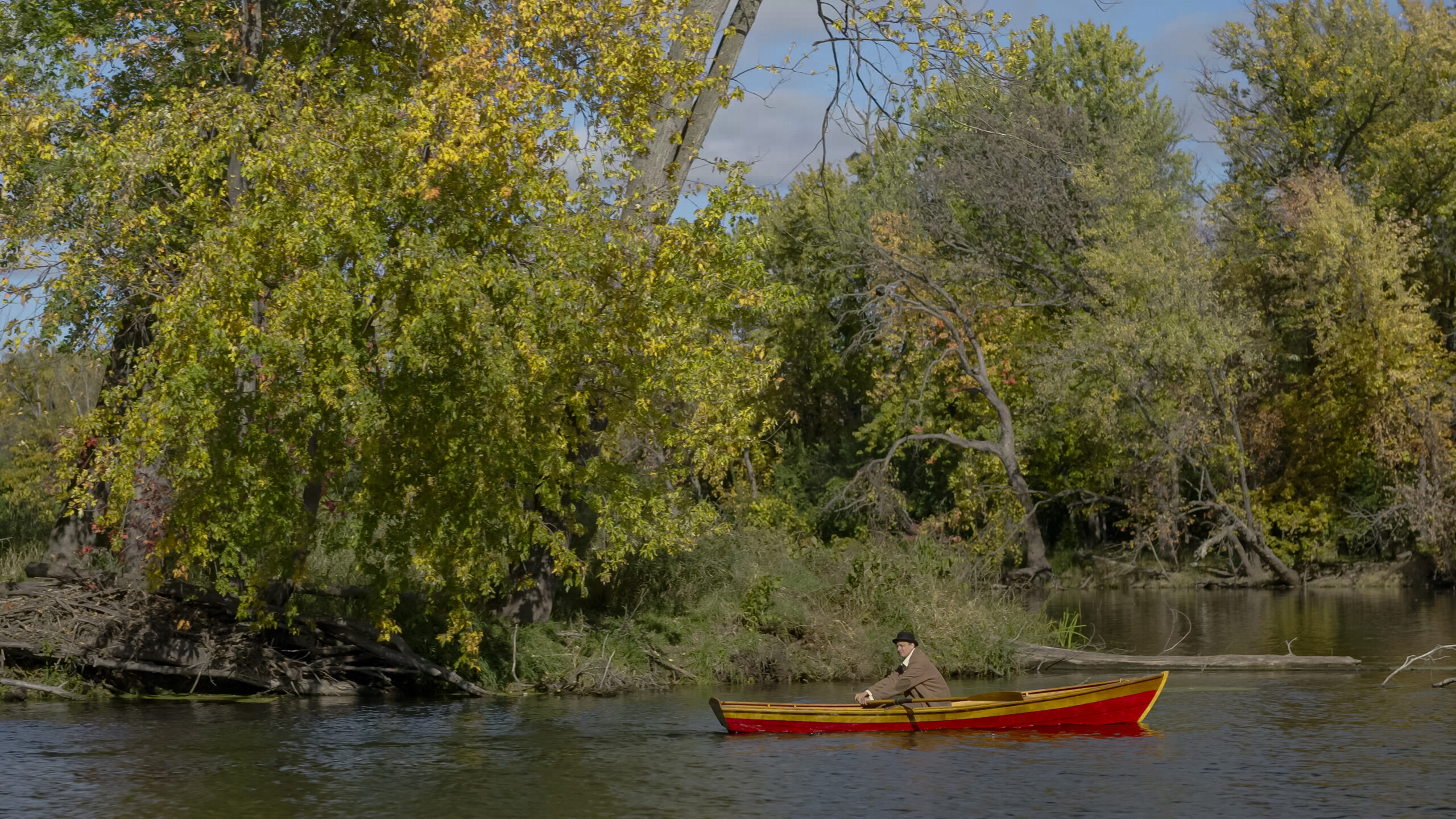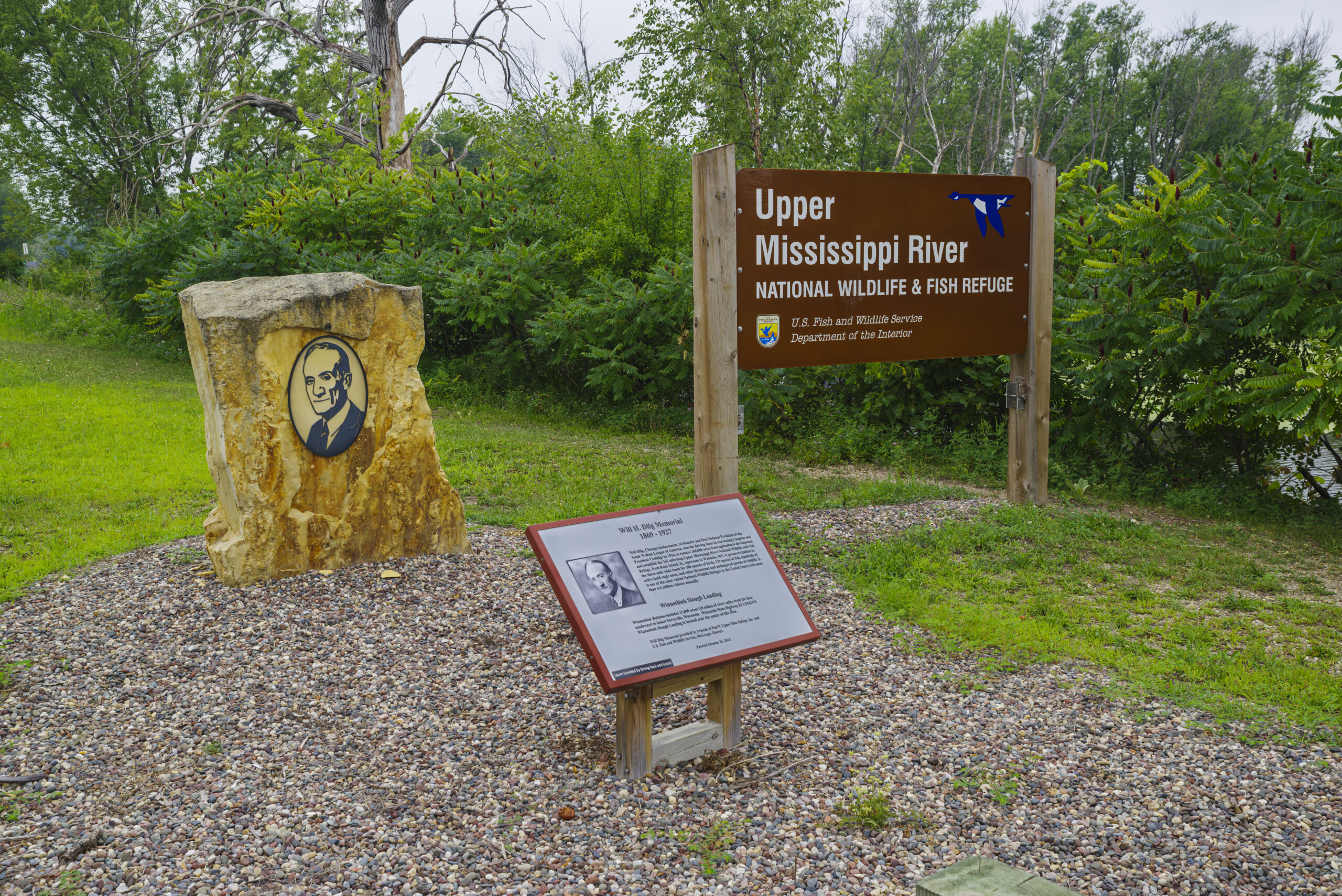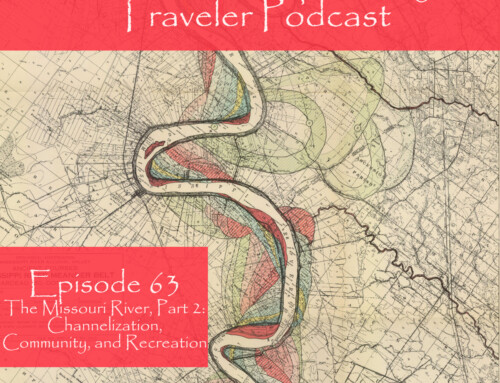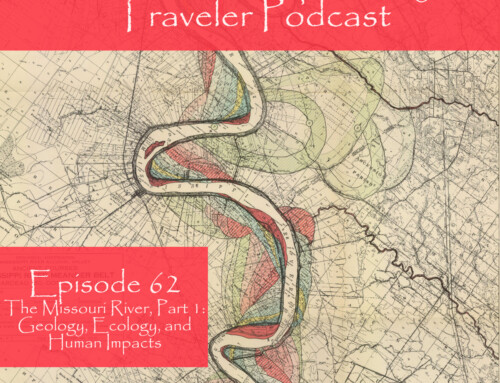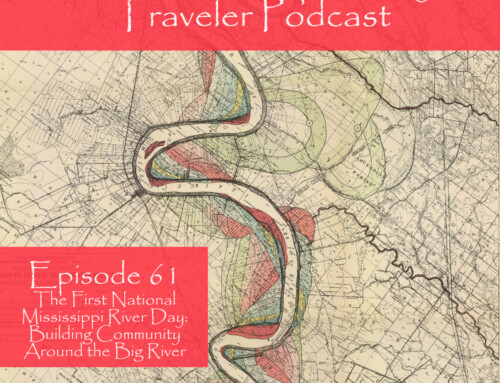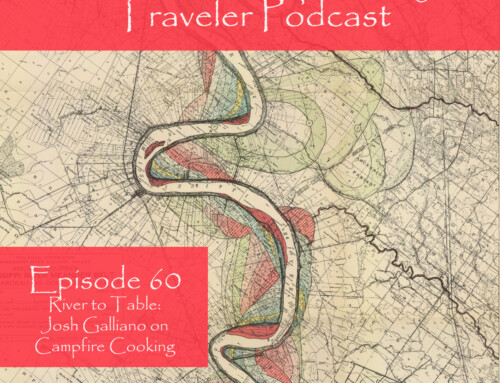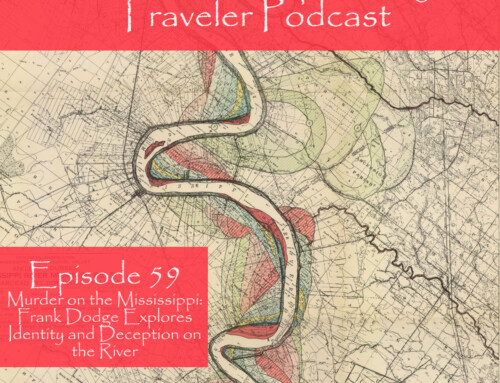In 1924, Will Dilg and the newly formed Izaak Walton League of America fought the proposed drainage of the lush Winneshiek Bottoms near Lansing, Iowa by lobbying for the creation of a new, unprecedented-in-scope federal refuge. In less than a year, they succeeded, and the Upper Mississippi River National Wildlife and Fish Refuge was born. This year, events throughout the upper Mississippi mark its centennial.
Will Dilg was probably more responsible for the success than anyone else. He was one founder of the Izaak Walton League and intimately familiar with the channels and islands of the upper Mississippi River. In this episode, I talk with Steven Marking, a musician and riverlorian who was so fascinated by Dilg’s story that he wrote an entire show about him.
In this episode, Marking talks about his own childhood on and near the Mississippi and explains how he felt connected to Dilg. We talk about Dilg’s love of the upper Mississippi, a tragedy on the river that changed his life, his role with the Izaak Walton League and lobbying for the refuge creation. We also talk about some of Dilg’s character traits that didn’t always endear him to others. We finish with a description of the new show that Marking created about Dilg.
In the Mississippi Minute, I preview some events coming up this summer to mark the centennial and mention a couple of my favorite spots.
Show Notes
Support the Show
If you are enjoying the podcast, please consider showing your support by making a one-time contribution or by supporting as a regular contributor through Patreon. Every dollar you contribute makes it possible for me to continue sharing stories about America’s Greatest River.
Don’t want to deal with Patreon? No worries. You can show some love by buying me a coffee (which I drink a lot of!). Just click on the link below.
Transcript
37. Steven Marking on Will Dilg
Sun, Mar 24, 2024 5:24PM • 56:51
SUMMARY KEYWORDS
refuge, river, mississippi, mississippi river, people, find, story, league, walton, today, part, land, accomplished, dams, fish, fishing, year, lived, movie, bass
SPEAKERS
Steven Marking, Dean Klinkenberg
Steven Marking 00:00
His love for the river and his desire to preserve it and create something wonderful for people to share is something that I, I really want to dedicate the rest of my life to. We have issues on the river and we have a beautiful river, but there’s a lot to be done and I want to be a part of it.
Dean Klinkenberg 00:48
Welcome to the Mississippi Valley Traveler Podcast. I’m Dean Klinkenberg and I’ve been exploring the deep history and rich culture of the people in places along America’s greatest river, the Mississippi, since 2007. Join me as I go deep into the characters and places along the river and occasionally wander into other stories from the Midwest and other rivers. Read the episode show notes and get more information on the Mississippi at MississippiValleyTraveler.com. Let’s get going.
Dean Klinkenberg 01:20
Welcome to Episode 37 of the Mississippi Valley Traveler Podcast.
Dean Klinkenberg 01:26
2024 is a big year along the Upper Mississippi. We are celebrating the 100th anniversary of the Upper Mississippi River National Wildlife and Fish Refuge. Quite a mouthful to spit that out. I’m going to feature the centennial in a couple of different podcast episodes this year. We’re going to kick it off by learning more about the man who is most responsible for the existence of the refuge, Will Dilg. Dilg is one of the founders of the Izaak Walton League, the group that advocated for the creation of the refuge and got it through Congress in less than a year. Can you imagine that? Dilg’s story is so big and fascinating that Steven Marking, a professional musician and riverlorian, produced a show to bring more attention to his life. So in this podcast I interviewed Marking about Dilg and his life. We begin by talking about Marking’s own childhood spending countless hours on the Mississippi. He grew up in Brice Prairie, Wisconsin not far from La Crosse. Then we’ll get into what Marking has learned about Dilg’s life. From the summer spent fishing on the river, to life altering tragedy, to his unprecedented efforts to establish the refuge. Marking describes Dilg’s, say sometimes challenging personal disposition, and how that ultimately led to a falling out with the organization he founded. We wrap it up with the description of the new show that Marking created to pay tribute to Dilg and hopefully you’ll all get a chance to check out his show. In a later episode, I’ll go deeper into the refuge itself with a discussion about what exactly are protected and the challenges facing the refuge for its next 100 years.
Dean Klinkenberg 03:10
As always, thanks to those of you who’ve shown me some love through Patreon. Your ongoing support makes me smile and it keeps this podcast going. If you want to join that community go to patreon.com/deanklinkenberg. Right now one of the benefits is that all Patreon subscribers get early access to all of these podcast episodes. If you don’t want to join Patreon but you want to show some support another way you can always buy me a coffee, I drink plenty of that. To find out how to do so go to mississippivalleytraveler.com/podcast and you’ll see instructions there and as always, there’ll be some links and photos in the show notes you’ll find those also at mississippivalleytraveler.com/podcast. And now on with the interview.
Dean Klinkenberg 04:10
Steven Marking spent his childhood in Brice Prairie, Wisconsin but he grew up on the Mississippi River. He received an undergraduate degree in Voice from Viterbo college in La Crosse, Wisconsin and a master’s degree in Vocal Performance from Peabody Conservatory in Baltimore. He spent 20 years singing opera and oratorio in the New York area. But the Mississippi River called him home in 2010. Since then, he’s discovered a new passion for and talent for photographing and filming his beloved river. Since 2012, Steve has worked as a rivelorian, a river historian and performer on river boats cruising the Mississippi, Ohio and Cumberland Rivers. When Steve’s home, he can often be found on the backwaters of the Mississippi in his old pontoon boat. He turned his passion for the river into a popular show called Our Mighty Mississippi, which combines songs and storytelling with visual imagery to celebrate America’s greatest river. Steve’s newest project goes deep into the life of Will Dilg, one of the founders of the Izaak Walton League, and perhaps the main reason we have a federal refuge along the Upper Mississippi River today. Welcome to the podcast, Steve.
Steven Marking 05:22
Thanks, Dean. I’m really, really glad to be here.
Dean Klinkenberg 05:26
It’s a pleasure to talk with you. You have so many different ways that you approach expressing your admiration and love of the river. I think it’s amazing that you can do it in song, you do it in photography, you write about it. Tell me a little bit first about sort of your childhood growing up with a river. Like what was that like?
Steven Marking 05:47
Well, I like to tell people that Tom Sawyer and Huck Finn had nothing on me because we had a wildlife refuge sign in our backyard. We had a dock right on the Black River channel, which after the locks and dams were put in, became a part of the Mississippi River system because it flooded the land in between. So it’s all one river system. So the Mississippi River was literally my backyard. We had a dock. My dad put a diving board on it. So all the kids would be in my backyard on every warm summer day. We had canoes, my dad was a Boy Scout leader. So we had canoes in the backyard, we had a fishing boat. And then I always get most excited when we put the ski boat in on the weekends to go camping on the Mississippi River.
Dean Klinkenberg 06:37
Fantastic. It sounds like it’s one of those like, I think maybe contemporarily now we’re calling like a free range childhood like you actually got to go out and explore things on your own.
Steven Marking 06:49
I did quite a bit. There was always conditions attached, you know, before I could get the boat by myself. Raking the yard, doing that kind of thing. But basically, our whole family lived through the week so that we could get out on the river on the weekend, and not just in the summer. You know, the spring the migration is on. And when the trees come into bloom, it’s it’s just glorious to be on the river and out in the flood. Playing with the ice floats coming down the river and seeing how far you can get without breaking through and stuff like that. Of course in the fall hunting ducks and geese. And in the winter, dad shoveled off or dad, we all shoveled off, a skating plan and my dad put lights up so we could play hockey after dark in the wintertime right in our backyard.
Dean Klinkenberg 07:45
Well it sounds idyllic. Sounds like a lot of fun.
Steven Marking 07:49
It was. It was. I did have an idyllic childhood. And I gotta thank my parents for that.
Dean Klinkenberg 07:56
Yeah. And one of the things that just strikes me as you’re talking about this is that because you spent so much time out there you really at a young age, you got very well acquainted with the river at different times of year, the different different water levels, you got to know the many various moods that the Mississippi could throw at us.
Steven Marking 08:17
I did and I’m really grateful for that. And of course, when I go with American Cruise Lines, everybody’s seeing the river and it’s summer, nice, smooth. And sometimes we have one snowstorm in the fall. But the river’s moods can change very abruptly, even even in the middle of this summer when a storm blows in. If you’re out on Lake Pepin, or someplace like that. You got to find shelter. So yeah, I’m quite familiar with the river and all of her various moods.
Dean Klinkenberg 08:52
So I’m going to go out on a fairly strong limb, I think and I’m going to suggest that maybe part of the reason you got so interested in the story of Will Dilg is because you could kind of relate to his love for the river and maybe some of his experiences, especially early on spending time on the Mississippi.
Steven Marking 09:11
Yeah, I had no idea when I started telling the story of the creation of the refuge, which Will Dilg is the central person in that story. I had no idea how much I would be channeling Will Dilg and his personality in my telling of the story. Because his passions and mine really are one in the same and his love for the river and his desire to preserve it and create something wonderful for people to share is something that I I really want to dedicate the rest of my life to. We have issues on the river. And we have a beautiful river. And but there’s a lot to be done. And I want to be a part of it.
Dean Klinkenberg 10:09
Right? So and this is like, the main reason that we’re talking today is because you have this new show about Will, and what I what I enjoy about this, like there are always so many different ways to approach some of these bigger stories and, and this year, we’re marking the centennial of the creation of the Upper Mississippi Refuge. But really, Will Dilg was probably the main reason this even happened. So I was really glad to see that you had spent a lot of time really digging into his life and learning about him and bringing his story to the rest of us. So let’s talk a little bit about him first, and what what do you know about his his background? Where did he grow up? How did he get connected to the Mississippi?
Steven Marking 10:57
Well, that was really difficult to find, especially early biography of Dilg, I have almost nothing because he he grew up in Milwaukee, but then, and got a college degree there. But then he moved to Chicago. So I know as a professional man, he was living in Chicago with a wife and then a young boy. And they, but his job was to promote liquor that he was a liquor salesman and a writer. He became a fantastic sports writer as well. He’d write about fishing, and published one book, Tragic Moments in Fishing. And he has had many articles in other national magazines as well, and had some fishing lures named after him, the Wilder Dilg Lures, which I actually ordered a couple of antique lures just so I could have them to put in my vest. So he was known. But then of course, prohibition came along in 1920. And put him out of work. And there is nothing you can find then. Did he become a bootlegger? We don’t know. He went to Winona every year, which was a hotbed for bootlegging. He owned a boat with an outboard motor, which early on, I mean, before, you could just go out and buy a Johnson or an Evinrude you know. So he was probably fairly well off throughout this prohibition period. And did all right. And we can only speculate as to where his money came from, because he was obviously mostly out of work. They could promote near beer, and things like that. There was still some advertising to be done. But for the most part, he became an out of work liquor salesman once prohibition hit. And so he really turned to his passion for the river and fishing and stepped that up.
Dean Klinkenberg 13:13
And we don’t really know then how he even sort of got interested in fishing in the outdoors in the first place, you know, from what you’ve learned?
Steven Marking 13:22
We don’t. I don’t even know if his father brought him to the Mississippi River or if he if his first trip was with friends. But I know he got hooked on the Upper Mississippi and would come to Winona every year and spend most of the summer there. Several months in a row, sometimes two and a half months in a row. And live on a what he called a houseboat. Today, we would call that a boat house. They didn’t have motors and go up and down and and the river looked very different because this was pre lock and dam. So islands and backwater channels were very different than than they are today. And we wouldn’t have the big pools that were that are held back by the locks and dams.
Dean Klinkenberg 14:16
It’s a it’s an interesting, I’m a little envious of this, but the fact that he could spend basically the whole summer living on a houseboat on the river. It does make make you wonder again, like what how was this guy making his living?
Steven Marking 14:31
Exactly. Me too. I mean, how does one get two and a half months to just hang out on the river in a houseboat and I’m working on it. I’m working on it. I haven’t quite achieved it yet, but I am working on that. But you have to somehow be making money while you’re doing that.
Dean Klinkenberg 14:53
So, so he got to see this river when like you said there was still a lot of backwater channels, thick complexes of islands. Probably rich with wildlife with birds and fish in particular. He was mostly interested in fishing though, right and it wasn’t there like one particular kind of fish he was especially enthusiastic about?
Steven Marking 15:21
Well, black bass was his his target, and he used a fly rod. And he would fish for black bass. Black bass simply is the category of small mouth and large mouth as opposed to white bass. And so he would lump them together and call them black bass. It’s not a term we use a lot today and so a lot of people aren’t familiar with it, but that’s how he wrote about it. And you’d see it in a lot of articles of the ’20s, people that fish for black bass. So he was a an avid fisherman, he not only fished he wrote about it, he could talk about it all day, I’m sure. And and he had some fishing stories. But the river itself one thing that I didn’t have time for in the telling of my story it was in in the beginning, but I you know, you have to make cuts when you’re making a movie was the fish rescue? There were 1000s, literally 1000s of ponds in the backwaters. Now think of it. A lot of our backwater lands were land not lake like they are now because the the locks and dams are holding back water that flooded it, right. So a lot of them were marshes and land that you could go out on and a lot of them had potholes and ponds, that after the flood would dry up. Well, our Bureau of Fisheries was actually formed by fish rescue, they would go out and rescue millions of baby game fish to stock lakes and streams all across the country. And when I say millions, over years, it became billions that they rescued. So much so that they became rather protective and were angry that the herons were out there feeding on those, the heron menace, they were out there, getting their baby bass, they want to stock these lakes with. Kind of a wonderful way of looking back and seeing how they became so proprietary over those those stranded bass in all these ponds. And we don’t have ponds like that anymore. That’s one of the major differences between the pre dam and post dam is that these landlocked ponds, that provided an incredible life cycle life and death cycle, you might say, but a rich bounty for the birds and the predators of the fish made it easy for them to catch because there was all these shallow ponds that the fish would get landlocked in every year.
Dean Klinkenberg 18:14
Right. And I just say like, those were important parts of the food chain for other animals at that time. So it’s interesting I hear the first thing that pops in my head is again, I sometimes get obsessed with the idea of how we manage too many things in the natural world for very narrow goals and miss out and then we can manage away the complexity and the real value of many of the areas that we value in the natural world and managing just for those black bass and then trying to keep the herons and other birds away is a good example of that, like the narrow goals and be managing for.
Steven Marking 18:50
It was narrow and that’s what we have to be really vigilant about today. We are stuck with managing the river now that the dams are in. We have to manage, we have to do dredging, we have to have physical projects out there. We can’t just let the river be a river or it’s gonna be giant mud flats of monocultures, that’s all we’re gonna have left. This was predicted by the Corps of Engineers. They, the head of the Corps of Engineers, actually said that. He said if we put these locks and dams in we eventually you’re going to you’re going to have massive swamps and disease and, and it’s not going to be good. And we’re reaching that point now. 90 years into it, 90 some years into the locks and dams, it’s time to time to manage this habitat and it’s going to cost billions of dollars.
Steven Marking 18:50
Yeah, exactly. What well, let’s get back to Will. So he had this luxury of spending these glorious summers on the river. But it wasn’t all good times, actually. Wasn’t there was a horrible tragedy one of those summers.
Steven Marking 20:07
Yeah, it really was. In 1921 his only son or only child, drowned while they were preparing lunch. And they didn’t notice he was out playing on the deck and they didn’t notice that he had somehow gone overboard. By the time they noticed it was too late. A friend did find him floating just downstream, and they weren’t able to resuscitate him. I did find the article of the police report in the Winona County Historical Society, which is why I have some details on that story. Extremely tragic. And it threw him into a deep depression. They did not, they avoided the river, they blamed the river. He and his wife Marguerite. They somehow survived that. I know a lot of couples sometimes can’t even survive a tragedy like that. But they eventually found their way back to the river. And, and I think coming out of that depression is what made him realize first off, his legacy was not going to be through a son or a daughter. His legacy would have to be something that he accomplished. And he saw that the drainage of the river’s lands moving upstream. Of course, the Delta down south was already drained 90% of the floodplain was now behind levees on the Lower Mississippi. I don’t know if it was completely 90% then but it is now, and I’m sure it was mostly already claimed by the 1920s. And and then it had moved up the Upper Mississippi. It moved up and they were building levees all the way up to Davenport. And currently 85% of our of our rivers lands are behind levees and being farmed. So all that habitat was destroyed. And so when the the government issued a permit to drain the Winneshiek Bottoms, that was the last straw for him. He’s like, I cannot stand by and see this happen. And he dedicated his life to this then, in fact, so much so that they called him a fanatic. They called him and he was a crusader. Some people said he was visionary. Because he was successful, had he not been successful, he probably would have just been a crank, you know. But he wasn’t going to take no for an answer from anyone. And, and he wasn’t going to pay attention to the budget in what he was trying to accomplish. He went to Washington DC, he stayed in hotel rooms, he you know, he didn’t keep his eye on the bottom line, he had blinders on, he could only see that these lands, these beautiful river lands and the habitat was about to be destroyed. And he was going to do everything in his power to to protect that. And that’s what led him to form the Izaac Walton League. He, he was inspired in one moment actually kind of came out of his depression in one moment that a friend of his documented fishing on a wing dam and below Wabasha and it just came to him that not only could they stop the drainage, but they could they could make the whole section into a National Preserve. In fact, that’s the only way it would be protected, protected, because opportunistic men would forever be after these river lands.
Dean Klinkenberg 24:11
So yeah, so it’s hard to, we can’t get in his head. You know, we don’t I guess have a lot of journal writings to work with here. But it certainly seems more than coincidental that after the death of his son, he finds a cause to sort of put his energy into to build his legacy, like you said, and that ended up being really the Upper Mississippi through the Izaak Walton League. And as I recall, like at the time in the country, there were some there was kind of a bit of a movement toward preserving what was left of the natural spaces that hadn’t yet been developed. There was some recognition that we were losing these places awfully fast. So I don’t there were a couple of other conservation groups around at the time, I believe before the Izaac Walton League.
Steven Marking 24:57
There were, but none of them had the national scope that the Izaac Walton League had, and none of them had the broad scope. Because Izaac Walton League was not just about stopping drainage. They were about managing forests, you know, stopping pollution. They had broad, broad ecological goals that were nationwide. And so once you formed a local chapter, you would have the weight of the state and the national behind you when you wanted to do a project. And that’s still ongoing. It’s still something that’s that’s really wonderful. And but to put it in context of, of how significant the Izaac Walton League was, and, and, and what Will Dilg accomplished, let’s just talk first about Will Dilg. I like to say, John Muir awoke our national environmental moral conscience, right. He wasn’t a public speaker. He was, he lived in the wilderness, but we read about him and we learn through his writings, how precious the wilderness is, and how essential it is to us. And then I like to credit Aldo Leopold, for fathering the methods of our modern conservation movements. He was the scholar, he was the guy who taught us what restoring land is by restoring a little piece of land and through his writings, and all of his knowledge of biology and sharing that. But Will Dilg was just as important as those two and his contribution was not was just as, as strong as theirs because Will Dilg sold the conservation movement to the American people. He’s the one who published, sold, preached, why we needed conservation. And, and he did it, he was very successful at selling it. And he got the Federation of Women’s Clubs behind him. And he thanked them in his victory speech, he never would have accomplished it without the women who had just won their right to vote four years earlier or two years ago, was that ’22. Anyway, they had just won their right to vote. And he, he went after them and see to see if they would partner and boy, they were eager to jump on board to save the beauty that our Upper Mississippi River has.
Dean Klinkenberg 27:48
So let’s clarify the timeline here a little bit. What year did his son die?
Steven Marking 27:54
’21.
Dean Klinkenberg 27:55
And then the Izaac Walton League was officially formed in?
Steven Marking 27:59
’22.
Dean Klinkenberg 28:00
’22. And alright, and almost out of the gate, then one of their, their big priority became the establishment of this federal refuge.
Steven Marking 28:10
Yeah, he had first before that he had been up to the Boundary Waters, and met with Sigurd Olson and pledged support for the Boundary Waters to keep the roads from being developed through there, and to keep that a wild area. So they weren’t the leading one leading group in that. That was Sigurd Olson, but he had already pledged support for that. And in fact, that’s something that I wished I could have found a picture of them together, but I could not. I don’t know if there was no photographers there or not. But this was their their first big battle, to be sure. And it was never before seen, government had never spent this much money, never done a project this large, 261 miles long. So it was unprecedented in several ways, an accomplishment that you could see why no one believed it could be done. No one thought he could be successful, at this goal. And, and you can imagine the kind of celebration that there was when when people saw that he was successful. What the Izaac Walton League and the women and everyone accomplished.
Dean Klinkenberg 29:39
Hey, Dean Klinkenberg here, interrupting myself. Just wanted to remind you that if you’d like to know more about the Mississippi River, check out my books. I write the Mississippi Valley Traveler guide books for people who want to get to know the Mississippi better. I also write the Frank Dodge mystery series that is set in places along the Mississippi. My newest book, “The Wild Mississippi” goes deep into the world of Old Man River. Learn about the varied and complex ecosystems supported by the Mississippi, the plant and animal life that depends on them. And where you can go to experience it all, find any of these wherever books are sold.
Dean Klinkenberg 30:21
So, let’s dig into the refuge creation itself a little bit then. And so the legislation for that was introduced in ’23.
Steven Marking 30:34
Yeah, it went through in about 11 months. He published his big article, “Drainage Crime of the Century”, in July. And in June, it’s June 7th, 11 months later, President Coolidge signed the bill and it had already been passed both houses. And it was an incredible accomplishment. Even today, I don’t know that anybody’s pushed a bill through and that large of a bill in that small amount of time and gotten that accomplished.
Dean Klinkenberg 31:10
Right, it seems almost unfathomable in today’s climate where it’s impossible to seemingly pass even the simplest pieces of legislation. And he meant he did that in such a quick period. Such quick turnaround. How, what did he do to make that happen?
Steven Marking 31:29
I think part of it, he must have been an incredible public speaker. And I don’t know that there’s any recordings of his voice, although we have voice recordings, from that time we have video from that time, cannot find a single one. We do have the minutes of Congress, that that for the debate of it, for the arguments and his arguments were excellent. And maybe they were right up there, the Trempealeau Drainage had already failed. So there was no guarantee that this massive filling in project would would even produce good farmland. And for sure, it would destroy all the game fish that that they were being rescued and the beautiful fishery that they had, all the hunting. And of course, back then, they weren’t valuing what we value today. Just getting out in nature. What you can do on the refuge and birdwatching, just breathing the air on the refuge, camping, canoeing, kayaking, just being a part of being on the water in this glorious. There is one thing that Dilg did say he was more than just a fisherman. He said a true angler is more an observer of nature than a getter of fish. And so, you know, that was in him, then that’s from the teachings of Izaac Walton, too, you know, you go all the way back to the 1600s in England and, and outdoorsmen are really observers of nature, and they’re the ones that know it well enough to know that we can’t do without it.
Dean Klinkenberg 33:29
Absolutely, yeah. Yeah, he, it’s still amazing to me how this worked. Maybe like at that time, maybe it was easier to also have access to certain members of Congress and lobby them directly. He met with the president right?
Steven Marking 33:45
He did. The the night before the bill went to the house, he realized that he had not put a provision in to give commercial traffic a right of way through the refuge. And commercial traffic had dwindled to almost nothing. So you can’t blame him for forgetting. But it wasn’t dead. And he knew that if he did not provide a way for commercial traffic to get through that his bill would be dead the minute it was introduced. And so he went to Secretary Herbert Hoover, Secretary of Commerce Herbert Hoover, who took him over to the White House and woke up President Coolidge to get him to sign off on a new provision in the bill for that would allow them the commercial traffic to move through the refuge so that we could he could get it passed. And I don’t think you know waking up the president the night before a bill goes to Congress is something most people have the power to do today. You know, especially a non elected official the way he was. And it just kind of demonstrates what people thought of him and the level that he had rose to as a speaker, as a lobbier or as a defender of the out out of doors.
Dean Klinkenberg 35:20
Yeah, I’m gonna go I’m gonna make a guess here that like, there are a couple of different bills out there today to provide additional funding for environmental restoration along the Mississippi, I don’t think either one of us is going to be able to make a phone call and get a meeting with the President to discuss this bill, any of the bills.
Steven Marking 35:39
Yeah, I think not. Times have certainly changed. But it just just makes the celebration all that more great to realize the lengths that someone went to, to secure this for us this right, this incredible thing that we have to use and and to celebrate this year.
Dean Klinkenberg 36:02
So you sort of hinted to it. Another part of the reason for the success is that he was able to get backing from some high profile groups that also had clout of their own. So the coalition building certainly was a very important reason for this as well.
Steven Marking 36:21
Yes, so the Federation of Women’s Clubs, which I recently learned is still going, I thought that they may have morphed into the League of Women Voters, but they are two separate organizations. But that gave him huge clout when they signed on, and he had women writing articles in support of the refuge. And, of course, the big article that he published, 2 million women in favor of a National Preserve. And that got republished in newspapers and magazines all across the country. You have to realize media was very different back then. And people read people read magazines, people read newspapers, that’s how they got their news. They didn’t have a television broadcast. Radio was was around but still pretty new. And for the most part, people read their news. So journalists had had the power back then. They were the ones who really told it like it was they brought people the news, and, and he was a fabulous journalist.
Dean Klinkenberg 37:37
Yeah. It just, it’s amazing. It’s a great story. And I wish there was a story that maybe now because of your efforts, and the centennial celebrations, this story will come to light a little bit more, but it’s amazing how quickly that all came together. And we’re still benefiting from all of that work today.
Steven Marking 37:56
You know, I hope so too. I hope someone picks up the ball and can find more biographical information and tell this story. I made a movie about it. And it’s a one man show movie. And I’m really proud of it. But I would hope someone in Hollywood would understand how significant this is and and cast it with a full cast and do a full movie on it. Because this is a forgotten American hero. People just don’t realize his significance in our conservation movement. And the people don’t realize the significance of the refuge itself, the first greatest, hard to define refuge because it’s got all these municipalities in it. And it’s all the other refuges are like, closed until they’re open. But this one is open until close because there’s so much going on how do you close a refuge like this? You know, it’s it’s a great story. And I would love love love if, if, if a bigger, bigger organization picked up and made a real movie with the full cast of it.
Dean Klinkenberg 39:15
So you’ve spent a lot of time then kind of getting to know him. So what’s your impression of his personality, his character? What kind of guy was he?
Steven Marking 39:27
I identify with him a lot. I think he was a bit of a blowhard, a bit of a loud mouth. He would he was never afraid to say what he thought. And he was never afraid to stand up for what was right. I think he was emboldened after his son’s death. I think that’s when he probably let go of his social etiquette of trying to play the center and not, you know, he became quite polarized after that. So much so that The League got split right down the middle after this great accomplishment. He had overspent, he had some of his proclamations in the victory speech, “Falterers and sunshine crusaders have no business within our league.” Yeah. you know and so he was assigning attributes to members of The League that maybe they might not have been comfortable with, you know, some of them were middle of the road people. But he became such a, an extrovert advocate for nature that it seems he didn’t really care if he burned some bridges. And that came back to haunt him because then he was voted out of office in ’25, or ’26, I think it was. Let’s see, he was in for four years. So that would be … Yeah, so I think it was ’26 he was voted out of office and then in ’27 he died of throat cancer. And he died knowing that he didn’t accomplish what he truly wanted, which was to form a Federal Bureau of Conservation, a cabinet level bureau of conservation, which he thought he could do. But he had he was with throat cancer, he was losing his voice and losing his life. Never lived to do that.
Dean Klinkenberg 41:48
Was he, when he was working on that? Was he as successful building a coalition to support that as he had been with the refuge?
Steven Marking 41:58
I’m not sure how far he got on it. I know, he had a lot of support in Washington for it. But The League itself had been split. And so he may have lost a fair amount of his grassroots, which would be central to passing a bill like that you wouldn’t get it just by having the support in Washington, you’d need the grassroots as well. So I think part of his fanatic crusader came home to roost afterwords. I heard, I don’t have it substantiated, but his family suffered greatly because of because of that. He and his wife and as other you know, extended family, a lot of people had to let go of Will because he became so with such blinders and such a fanatic. And so but would he have accomplished it had he not adopted that personality? You know, so a complex figure to be sure, and makes it even more intriguing because of the the tragedy of the end of it all, but yet the glory of what we we get to enjoy for it. So it makes it a great, a truly great American story all around.
Dean Klinkenberg 43:33
Are there there any memorials to him anywhere?
Steven Marking 43:37
Yeah, there’s a great one. Prairie Island has a big one in Winona. You could drive out on Prairie Island. It’s the old Izaac Walton clubhouse. It’s currently owned by the City maybe changing hands again soon. But that memorial is glorious and it even has a small memorial off on the right side to his son, John, who drowned and I use that in my movie. And the Friends of Pool 9 put a beautiful one up at the Winneshiek Landing. So the Winneshiek Bottoms were ground zero for the the battle. So that’s where the permit was first issued on the Upper Mississippi. And so at the Winneshiek Landing, there’s a beautiful memorial and a plaque right next to the Fish and Wildlife sign. And it’s a nice, nice picture. It’s actually my picture that I took of it was in Outdoor America this month, and might be something you want to put on your blog. It’s a nice, nice shot kind of encompassing it. So we have those two memorials. But other than that, when you say ‘Will Dilg’, people are like, “Who, how do you pronounce that? Who is this guy?” For the most part he is is an unknown quantity in American history.
Dean Klinkenberg 45:05
Well, I’m I know, you’ve kind of made it your own mission to rectify that as well with the show. So tell us a little bit about the show you’ve put together about him.
Steven Marking 45:13
Well, I wanted to continue my work with video and photos, because I have been doing Our Mighty Mississippi this way for years. So while I’m telling stories and singing songs, I’m projecting the images of the river that go along with this stories and songs. And I wanted to do that with this show as well. Didn’t even think about doing a movie at first, it was just how the live show would look, with the refuge, kind of being the star. And from the beginning, I had that concept. Because there’s so many documents and articles that I could throw up there. And be on the screen that you’re reading the story and you’re seeing all of this substantiated the story is substantiated by all these. But really, as a riverlorian, what I learned is that people appreciate the story that they’re hearing, and they don’t need so much documentation. So I’ve only included maybe 10% of the documents that I included in the show. And instead I’ve made the refuge the star. So you see, like my opening sequence sequence is still photos of the lotus in bloom first the blossom, and then the, the beds and the flower and then the seed pod. And then I’ll go and do some documentation, show some documentation. But then I’ll go back to the the marsh milkweed, or one scene while I’m telling a story, you see the sky just fill with canvasback ducks and then they come and they land as they approach the camera, they get closer and closer. And I think the showing the glories of the refuge is what motivates people to care about the refuge and care about the river when they see the flora and fauna that lives out there. And they see that that still exists. Because they don’t see it in their own backyard. They say, oh, well, that’s definitely worth preserving. We need to we need to preserve that. So I told the story, with that backdrop, weaving in and out. And most of this script, I’d say over 50% is his own documented words. I tried to stick to that. And then until the end of the movie, when I did have to make up words, I tried to stick to his vocabulary, you know, he didn’t have things like critical habitat, he didn’t have things like, you know, you know, they just referred to pollution as a general thing, you know, they you know, the nitrates and the phosphorus and things like that. So he they didn’t have the this documented science behind it all. And so I save that for the last 10 minutes of the show. And in the last 10 minutes of the show, I almost didn’t do this but I said I cannot resist, Will Dilg steps out and talks about today’s river. And he talks about what you can do, the listener, the the person who’s watching what can you do, to help preserve help manage this river and, and so there’s a call to action at the end. And then I do start using more of the modern verbiage that we’ve come to know.
Dean Klinkenberg 48:53
I was lucky enough to get to see a performance a couple of weeks ago at the event organised by the Friends of Pool 9 and it’s a really good show and I love the way that you mix the video and the still photography with singing but also with kind of dialogue with yourself. You have some shots of yourself out acting as Will Dilg in the refuge. And there are moments when you’re in or interacting with that version of yourself but I thought it’s a very creative way to entertain but also to to show off as you said all those the richness of the refuge, so I hope people get a chance to see it. Do you have performances scheduled coming up, as as we record today it’s March 24 2024?
Steven Marking 49:37
I’m not in the, I just did a contract for Joe Davies down in Galena Center for the Arts on August 23rd. I will be doing some more in the area but I don’t have all the bookings finalized yet. So you just gonna have to check with StevenMarking.com in order to see those, I’ll always post those. And I’ll be sharing them with social media and wherever I can to get the live performances. But also, I’ve got a movie that I’m hoping for an April 15th release of. I actually, I’ve only got two or three finishing touches to do on the movie. So a movie version so that more people can see it, you don’t have to come to a theater to see it. You can stream it right from my website, and watch it in the comfort of your own home. So that’ll be coming soon on StevenMarking.com as well. Just to get back to the two different characters, though, one of the things I did because sometimes he’s speaking to try and sell the refuge. And I’m like, well, how do I reconcile that with Will Dilg being back here today talking with people. That’s why I created the two Will Dilgs. So you’ll see one of them in a suit is the 1920s Dilg, still selling the refuge to the people of 1920. And then there’s the fisherman Dilg, again a beautiful fishing suit, and he’s out and he’s the one talking to the people of today. So that’s how I kind of separated those two.
Dean Klinkenberg 51:24
So what is the title of the film?
Steven Marking 51:26
A Visit From Will Dilg.
Dean Klinkenberg 51:29
All right, so people should check StephenMarking.com In the near future to actually they should check there anyway to find out about any other dates you have booked for this or for any of the other shows or performances that you do. Are there any other places where folks can keep up with the work you’re doing? Do you have Instagram or any social media?
Steven Marking 51:51
Oh, gosh, Fritz’s site here the the 100th anniversary of the refuge, that is UpperMiss100.com. Fritz has put together where any celebrations that have to do with me or not of the centennial, is that’s where you can go and check if there’s something near you. So that’s just called UpperMiss100.com. And it also if you’re planning something, make sure it’s posted on there.
Dean Klinkenberg 52:37
I will post the link to that and to your website in the show notes so people can just go there directly for those links as well. Steve, this was fantastic. Thanks so much for sharing everything that you’ve learned about Will Dilg, about the refuge, about sharing your your life, your childhood growing up with a river. Thanks so much for your time today.
Steven Marking 52:59
You’re welcome, Dean. It’s a real pleasure real pleasure speaking with you this morning.
Dean Klinkenberg 53:14
And now it’s time for the Mississippi Minute. Well as as we mentioned many times during this podcast this year marks the centennial of the Upper Mississippi River National Wildlife and Fish Refuge. A lot of things going on to mark the centennial this year. The probably the best place to keep track of all that is that UpperMiss100.com The number 100 dot com. I’ll put a link to that in the show notes. And just in case you don’t know how to find that go to mississippivalleytraveler.com/podcast/ and then just click on the link to Episode 37 and you’ll find the show notes right there. Here’s just a quick sampling of some of the events that have already been announced. The National Mississippi River Museum and Aquarium in Dubuque is going to open an exhibit on April 20th that will highlight or feature the origins or the beginning of the the refuge itself. The Izaak Walton League of Winona is gonna be hosting a film festival in Winona on June 7th and 8th. There’s gonna be a big fun music and art festival at the smokestack in Dubuque on June 9, one of the bands playing is Big Blue Sky, one of my favorites and a band at home in the Driftless area. But besides those events, you’ll also find at various times, guided bird walks, guided canoe trips, river cleanups, eco tours, there’s just going to be a whole bunch of things going on. So I say I would suggest just going to UpperMiss100.com clicking on events and seeing what’s going on near you. And heck, why not go to multiple events this year. There’s going to be no shortage of options. There are so many beautiful places in the refuge and maybe this is a good year to get out and explore and find yourself a few new favorites. Now just a couple of places I know on my short list – I love walking around the prairie outside the visitor center at the National Refuge Visitor Center in Brice Prairie. They have a couple acres of restored prairie there that full of flowers. Once we get into the spring and summer. And the Winneshiek Bottoms a place that inspired Dilg to fight for creation of the refuge in the first place is still today is a wonderful place to get lost in. So what are some of your favorite spots in the refuge? You don’t have to give away your deeply held secrets, but but I’d love to hear from you. I’d love to know what some of your go-to spots are.
Dean Klinkenberg 55:51
Thanks for listening. If you enjoyed this episode, subscribe to the series on your favorite podcast app so you don’t miss out on future episodes. I offer the podcast for free but when you support the show with a few bucks through Patreon, you help keep the program going. Just go to patreon.com/deanklinkenberg. If you want to know more about the Mississippi River, check out my books. I write the Mississippi Valley Traveler guide books for people who want to get to know the Mississippi better. I also write the Frank Dodge mystery series at certain places along the river. Find them wherever books are sold. The Mississippi Valley Traveler Podcast is written and produced by me Dean Klinkenberg. Original Music by Noah Fence. See you next time.
